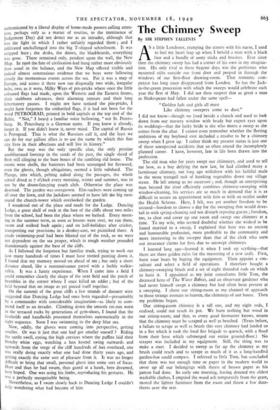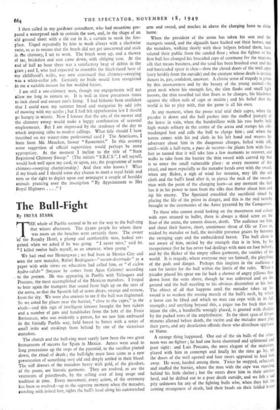The Chimney Sweep
By SIR STEPHEN I ALLENTS
S S a little Londoner, tramping the streets with his nurse, I used to feel my heart leap up when I beheld a man with a 'black face and a bundle of sooty sticks and brushes. Ever since
then the chimney sweep has had a corner of his own in my imagina- tion. His only rival in those bygone days was the performer who mounted stilts outside our front door and peeped in through the windows of our first-floor drawing-room. That romantic com- petitor has long since disappeared from London. So has the Jack- in-the-green procession with which the sweeps would celebrate each year the first of May. I did not then suspect that as great a man as Shakespeare had fallen under the same spell- " Golden lads and girls all must Like chimney sweepers come to dust."
I did not know—though we lived beside a church and used to look down from our nursery window with beady but expert eyes upon its weddings—that the lucky bride is she who meets a sweep as she comes from the altar. I cannot even remember whether the fleeting ambitions of my boyhood ever included a resolve to be a chimney sweep when I grew up. I rather think my present status is just one of those unexpected accidents that so often attend the incompletely planned career. I have, however, late in life been drawn into the profession.
The old man who for years swept our chimneys, and used to tell me how, as a boy defying the new law, he had climbed many a farmhouse chimney, not long ago withdrew with his faithful mule to the more tranquil task of hawking vegetables down our village street. He left among us no successor ; and, though an enterprising man beyond the river efficiently combines chimney-sweeping with window-cleaning, his services are so much in demand that it is as difficult to secure an appointment with him as With an oculist under the Health Scheme. Here, I felt, was yet another freedom to be secured—freedom to choose a day for the sweeping that would dove- tail in with spring-cleaning and not disturb reposing guests ; freedom, too, to clear and cover up one room and sweep one chimney at a time. To my wife, who seemed doubtful whether she wished to be found married to a sweep, I explained that here was an ancient and honourable profession, more profitable to the community and more interesting to the sweeper than that of the clerk who sorts out insurance claims for fires due to unswcpt chimneys.
I learned long ago—learned it when I took up scything—that there are three golden rules for the mastering of a new craft. First, burn your boats by buying the equipment. Then appoint a con- sultant and select a field of operations. I therefore bought a chimney-sweeping brush and a set of eight threaded rods on which to hoist it. I appointed as my joint consultants little Tom, the deceased hero of The Water Babies, and an observant gardener who had never himself swept a chimney but had often been present at a sweeping. I chose our sitting-room as my channel of approach to those strange avenues to heaven, the chimneys of our house. Then my problems began.
Our sitting,room chimney is a tall one, and my eight rods, I realised, could not reach its pot. We burn nothing but wood in our sitting-room,- and that, as every good firemaster knows, means that the chimney must be scraped as well as brushed. (Years before, a failure to scrape as well as brush this very chimney had landed us in a fire which it took the local fire brigade to quench, with a flood from their hose which submerged our entire ground-floor.) No scraper was included in my equipment. Still, the thing was to make a start. I decided to sweep as far up the chimney as my brush could reach and to scrape as much of it as a long-handled garden-hoe could compass. I referred to little Tom. but concluded that there was not enough time or paper in the modern world to cover up all our belongings with sheets of brown paper as his patron had done. So early one morning, having donned my oldest washable clothes, I emptied the wood ash temporarily from the grate, moved the lighter furniture from the room and threw a few dust- sheets over the rest. I then called in my gardener consultant, who had meantime pre- pared a waterproof sack to contain the soot, and, in the shape of an old ground sheet with a slit cut in it, a curtain to mask the fire- place. Urged repeatedly by him to work always with a clockwise twist, so as to ensure that the brush did not get unscrewed and stick in the chimney, I set to work. The brush went up, and a shower of tar, brickdust and soot came down, with obliging case. At the end of half an hour there was a satisfactory heap of debris in the grate ; and I, who had expected to resemble the black-faced hero of my childhood's walks, was now convinced that chimney-sweeping was a white-collar job. Certainly no bride would have recognised in me a suitable mascot for her wedded future.
I am still a one-chimney man, though my engagements will not allow me long to remain so. It is well in these precarious times to look ahead and ensure one's living. I had hitherto been confident that I could earn my summer bread and margarine by odd jobs of mowing with my scythe ; but I had felt apprehensive lest I should go hungry in winter. Now I foresee that the arts of the mower and the chimney sweep would make a happy combination of seasonal employments. But I am impressed by the tendency of the day to attach imposing titles to modest callings. What title should I have Inscribed on my winter-time professional card ? The Americans, I learn from Mr. Mencken, favour " fluonomist." In this country some suggestion of official supervision would perhaps be more appropriate. At the moment I incline to the title of " State Registered Chimney Sweep." (The initials " S.R.C.S.", I tell myself, would look well upon my card, or upon, say, the programme of some chimney-sweeping championship.) And then who knows ? What if my brush and I should some day chance to meet a royal bride and earn us the right to depict upon our notepaper a couple of heraldic animals prancing over the inscription " By Appointment to Her Royal Highness . . . ." ?















































































 Previous page
Previous page